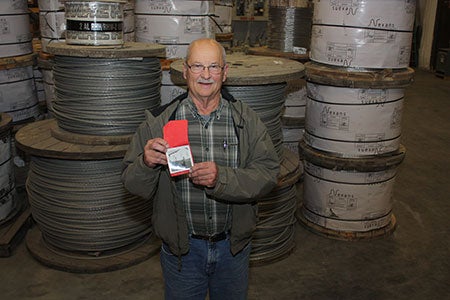The flickers of candles illuminating a Christmas program at a country school is the idyllic image of a traditional holiday celebration. That image is often only captured in paintings and illustrations. However, Northern Electric Cooperative member Daryl Rieck remembers a time when light from lanterns and lit wicks were not used for ambiance but were a necessary way of life in rural Brown County.
“We had oil lamps with the wick you crank up and down,” Rieck recalls. “They would send a note home from school that would say when you come to the Christmas program please bring a lamp.”
That is because Rieck lived with his parents and three siblings on a farmstead 22 miles southwest of Aberdeen. The Riecks attended a one-room country school and up until the early 1950s, there was no electricity in their corner of Brown County.

“I can remember when people got electricity. When you drove home (from Aberdeen) in the dark you could see yard lights on,” Rieck said as he shared memories of his childhood.
The co-op was working to bring electricity to the country. Rieck said his grandparents who lived in Warner and Aberdeen had power, so there was excitement that the electrification of rural Brown County was inching closer to his family’s farm.
During the late summer of 1953, the farm a mile north of the Rieck place received power from Northern Electric Cooperative. Rieck said his family was supposed to get electricity next – just in time for winter.
“That was the plan and we were going to get it,” Rieck said.
However, the anticipation of the bright light of electrification was quickly snuffed out by a visitor to the farm shortly before Thanksgiving.
“I was only in the fourth or fifth grade, but I could tell from a distance that it was not good news,” Rieck said.
Rieck said a representative from the Rural Electrification Administration (REA) stopped by the farm to talk with his dad. The REA representative said that they would not be able to hook up the rural farmstead until spring. The Riecks would have to go through another winter without electricity. Rieck remembers that his father, Lester, solemnly accepted the news and quietly walked into the house to tell his family.
“Dad just said, ‘Well, we are not going to get electricity.’ That event was a very sad time at our house,” Rieck said.
But that sad feeling of another dark winter on the farm quickly turned around. The next day the same car drove down the same rural gravel road and the same REA representative got out to greet Lester. Rieck recalls the REA representative said that he did not sleep well that night. The REA representative informed Lester that his quiet acceptance of the news that they would not get electricity ‘messed up’ his day.
“Dad had no clue what he meant,” Rieck said. “Then the guy said, ‘Most people get mad and cuss me out when I have to bring them this news and then I don’t feel too bad. You didn’t do that and then I remembered your four kids and how disappointed they would be. I could not sleep last night.’”
The REA representative said he had visited with the crews back at the Northern Electric headquarters and they were going to do whatever they could to make sure the Rieck farmstead was electrified before winter. It was a promise that was kept and the Rieck home had power shortly before Christmas.
“The moment that I really remember was when I was in the barn helping dad milk the cows after dark that night and seeing every window in the house brightly lit,” Rieck said. “They got our school connected too, so things were brighter everywhere that winter.”
Electric lights decorated the Christmas tree for the first time that year and the school did not request lamps for the Christmas program.
Rieck remembers that electrification was a great Christmas present, but his mother thought the new request from school was not.
“Mom thought the lamps were nice.”
By: Ben Dunsmoor
